How To Create A Choropleth Map In Arcgis
How to Create an Animated Choropleth Map with Less Than 15 Lines of Code
Using Plotly Express in Python on Jupyter
![]()
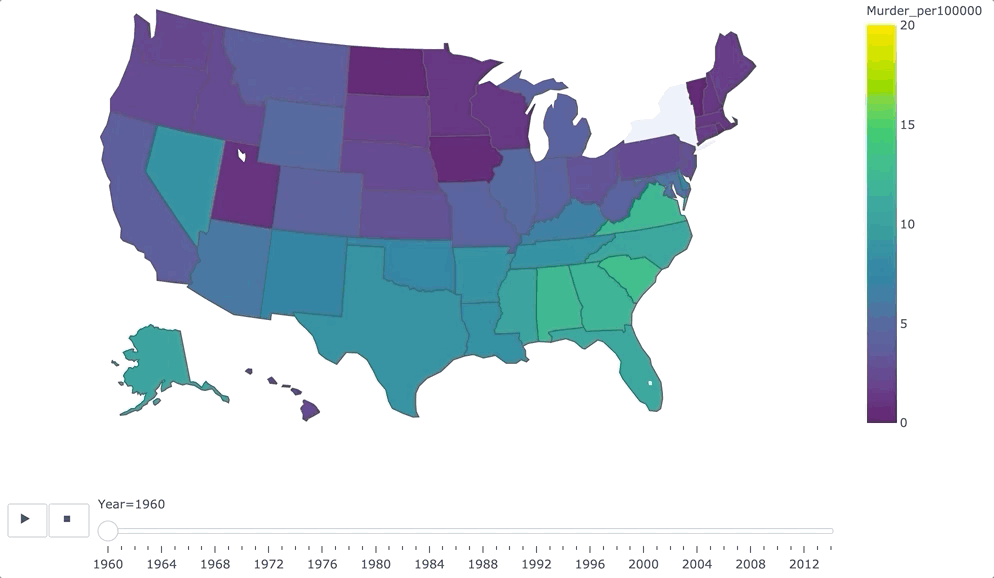
Table of Contents Introduction 1. Choropleth maps
2. Data
3. Animated choropleth USA map
4. Animated choropleth world map Conclusion
Introduction
Plotly Express makes it easy to create animated graphs. The official document says that "Although Plotly Express supports animation for many chart and map types, smooth inter-frame transitions are today only possible for scatter and bar."
Even though choropleth maps are not mentioned, in this article you will find just how easy it is to create animated choropleth maps using Plotly and Python on Jupyter.
This article assumes you are already familiar with the basic operation in JupyterLab/Jupyter Notebook and you have Plotly installed .
Choropleth maps
A choropleth map is a map composed o f colored polygons. Plotly Express' px.choropleth function and the lower-level go.Choropleth graph object can create choropleth maps and you can find some examples on the official website. You can only zoom in or out of the maps.
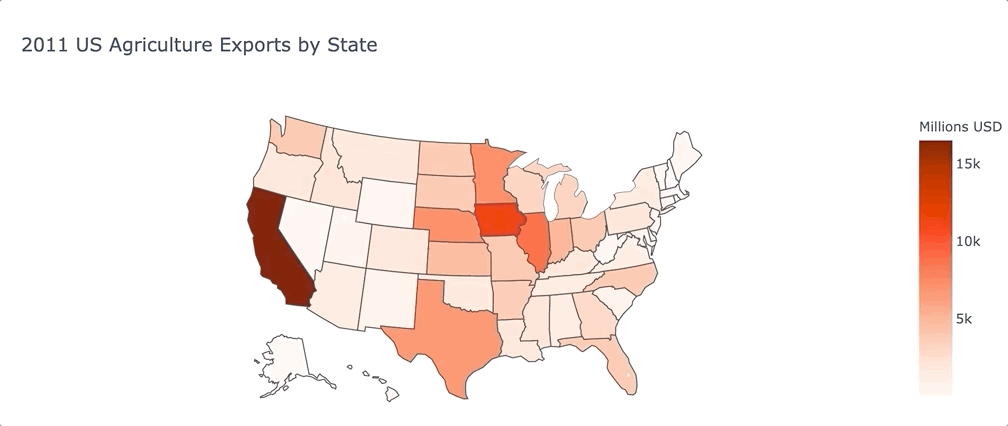
choropleth map (code). Image by author. Data
We're going to use the murder rate in the US. Data was originally published by the FBI, and Julia Poncela-Casasnovas modified it. You can find it here.
import plotly.express as px
import pandas as pd df = pd.read_csv('https://gist.githubusercontent.com/shinokada/f01139d3a024de375ede23cec5d52360/raw/424ac0055ed71a04e6f45badfaef73df96ad0aad/CrimeStatebyState_1960-2014.csv')
df = df[(df['State']!= 'District of Columbia' )]
df
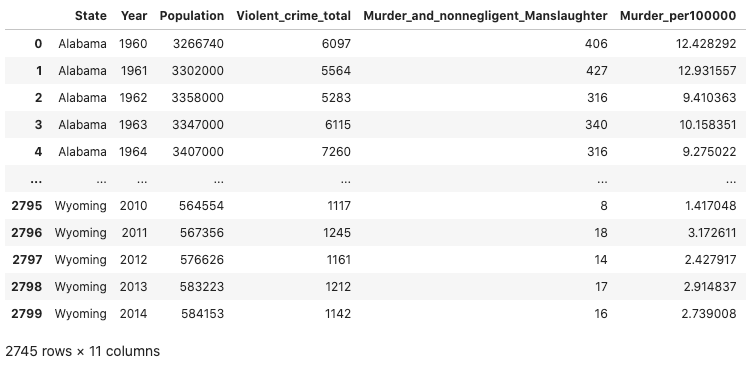
The DataFrame's columns have the following values.
df.columns # Output
Index(['State', 'Year', 'Population', 'Violent_crime_total',
'Murder_and_nonnegligent_Manslaughter', 'Murder_per100000',
'Legacy_rape_/1', 'Revised_rape_/2', 'Robbery', 'Aggravated_assault', 'State_code'], dtype='object')
Animated choropleth USA map
import plotly.express as px
import pandas as pd df = pd.read_csv('https://gist.githubusercontent.com/shinokada/f01139d3a024de375ede23cec5d52360/raw/424ac0055ed71a04e6f45badfaef73df96ad0aad/CrimeStatebyState_1960-2014.csv')
df = df[(df['State']!= 'District of Columbia' )] px.choropleth(df,
locations = 'State_code',
color="Murder_per100000",
animation_frame="Year",
color_continuous_scale="Inferno",
locationmode='USA-states',
scope="usa",
range_color=(0, 20),
title='Crime by State',
height=600
)
Line 1–5:
Import plotly.express and pandas. We create a DataFrame using pd.read_csv. We remove the District of Columbia rows under the State column.
Line 7–17:
We instantiate the plotly.graph_objects.choropleth object and set parameters.
- location: This parameter sets the coordinates via location IDs or names. We use State_code column values for locations.
- color: We use theMurder_per100000 value to change the color of the state.
- animation_frame: This allows us to animate and add the play and stop button under the map.
- locationmode: determines to match entries in locations to regions on the map. Values are "ISO-3" or "USA-states".
- scope: limits the map to this value. The available scopes are: : 'world', 'usa', 'europe', 'asia', 'africa', 'north america', 'south america'.
- rang_color: determines the value of the scale on the right. Use 0 and the max value.
- title: is the tile of the map.
- height: is the height created map.
- color_continuous_scale: We can set any color scheme from the following list.
from textwrap import wrap named_colorscales = px.colors.named_colorscales()print("\n".join(wrap("".join('{:<12}'.format(c) for c in named_colorscales), 96))) # Output
aggrnyl agsunset blackbody bluered blues blugrn bluyl brwnyl bugn bupu burg burgyl cividis darkmint electric emrld gnbu greens greys hot inferno jet magenta magma
mint orrd oranges oryel peach pinkyl plasma plotly3 pubu pubugn purd purp purples purpor rainbow rdbu rdpu redor reds sunset sunsetdark teal tealgrn viridis
ylgn ylgnbu ylorbr ylorrd algae amp deep dense gray haline ice matter solar speed tempo thermal turbid armyrose brbg earth fall geyser prgn piyg
picnic portland puor rdgy rdylbu rdylgn spectral tealrose temps tropic balance curl delta edge hsv icefire phase twilight mrybm mygbm
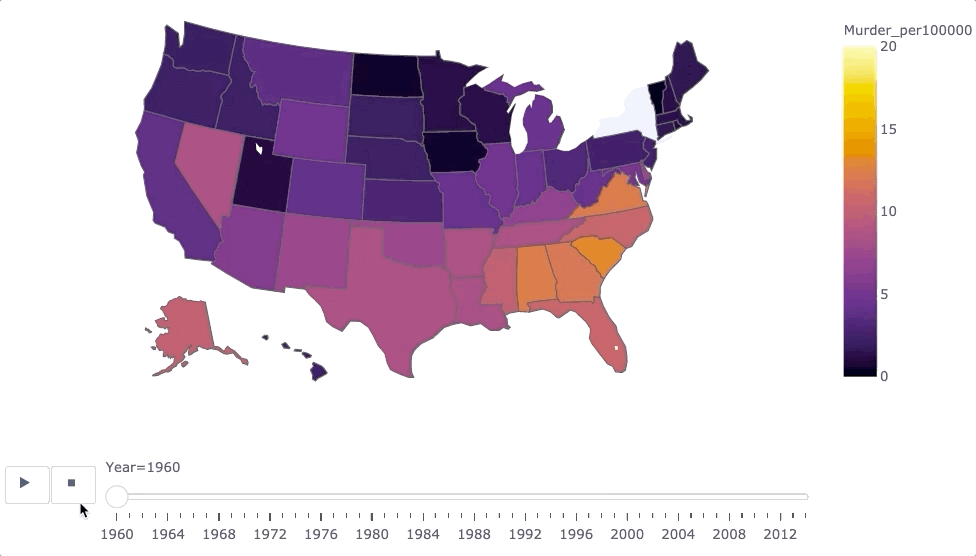
Animated choropleth world map
Let's create an animated choropleth world map. Plotly has sample datasets and we're going to use the Gapminder.
import plotly.express as px gapminder = px.data.gapminder()
display(gapminder)
Output:
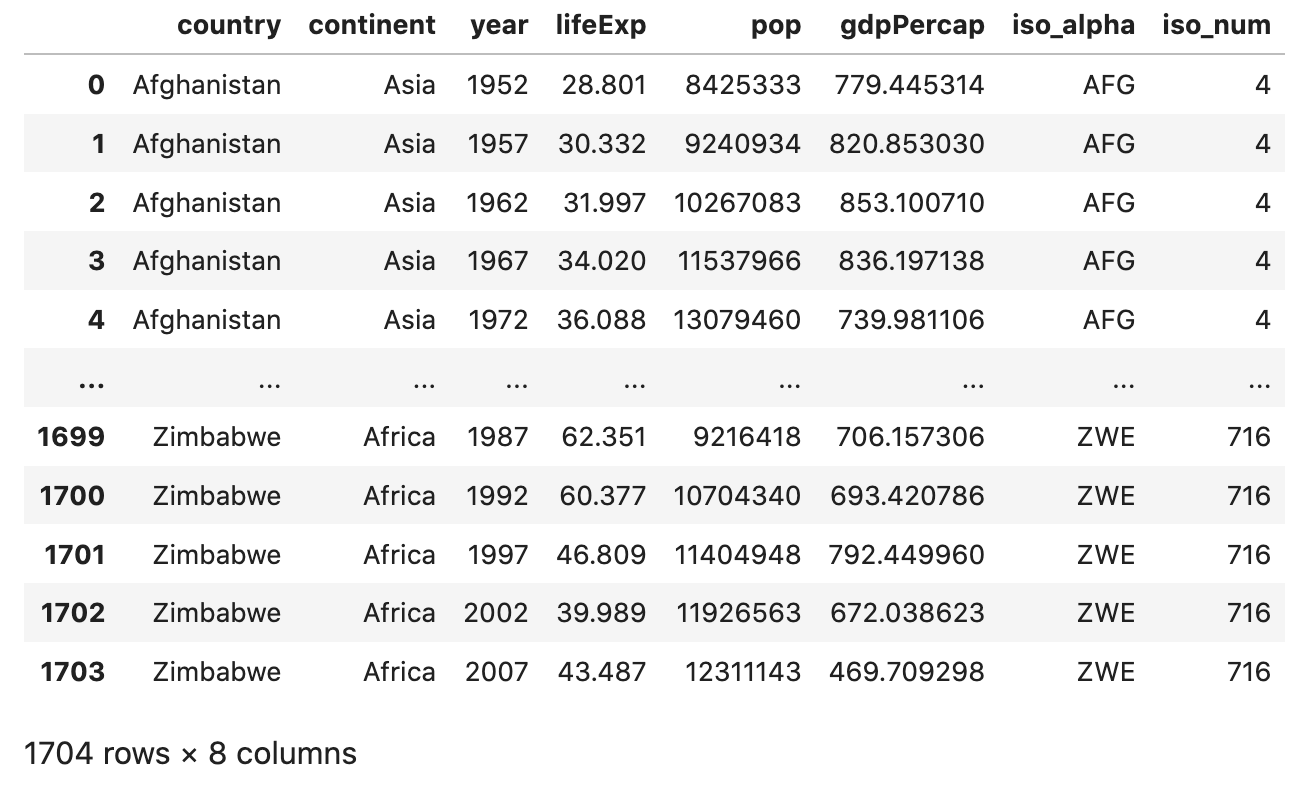
import plotly.express as px
gapminder = px.data.gapminder()
px.choropleth(gapminder,
locations="iso_alpha",
color="lifeExp",
hover_name="country",
animation_frame="year",
color_continuous_scale='Plasma',
height=600
) 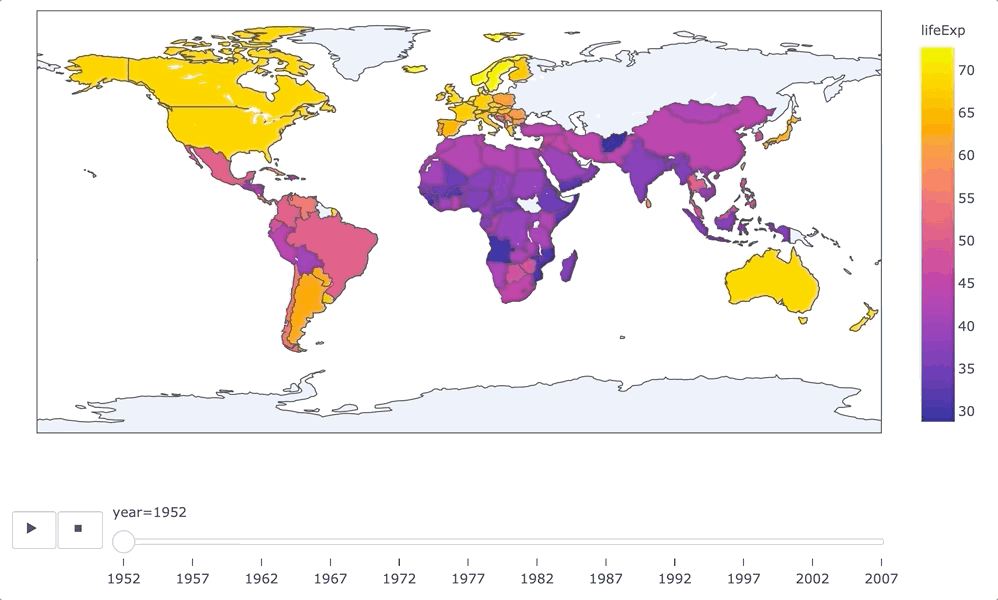
Conclusion
The official website does not have an example of an animated choropleth map, but it is easy to create using animation_frame and setting proper parameters.
Are you inspired to try it for your next project?
Newsletter

Get full access to every story on Medium by becoming a member .
How To Create A Choropleth Map In Arcgis
Source: https://towardsdatascience.com/how-to-create-an-animated-choropleth-map-with-less-than-15-lines-of-code-2ff04921c60b
Posted by: pepperhisday.blogspot.com

0 Response to "How To Create A Choropleth Map In Arcgis"
Post a Comment